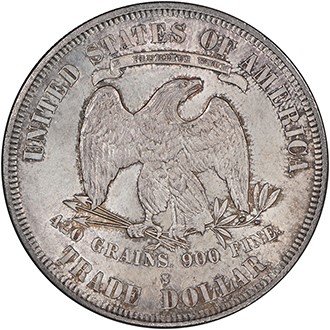Counterfeit Detection: 1878-S & -CC Trade Dollars
Posted on 1/11/2023
The U.S. Mint had high hopes when it introduced the Trade dollar in 1873. Silver miners believed the Chinese market held incredible potential, but it never lived up to expectations. Millions of Trade dollars also found their way into U.S. circulation at a time when silver values had plummeted, earning the American public’s scorn.
The Trade dollar’s six-year run of business strikes ended ingloriously when Congress revoked its legal-tender status in 1876 and ordered that only enough be produced for international trade. The Treasury Secretary terminated production of business strikes in early 1878, and only proofs were made for several years. The final year, 1885, saw a mere five proofs produced for a mint employee, and these are now counted among the greatest rarities in U.S. numismatics.
Numismatic Guaranty Company (NGC) recently received two purported 1878 Trade dollars, one with the common “S” mintmark and another with the “CC” mintmark. (As the rarest business strike, the 1878-CC has a mintage of 97,000, many of which likely were melted.)
 |
 |
| A counterfeit 1878-S Trade Dollar (top) and a counterfeit 1878-CC Trade Dollar (bottom). Click images to enlarge. |
|
The submitted dollars have an unnatural luster, which is especially evident on the 1878-CC. The denticles are also rather rough. Both coins also exhibit repeating depressions and marks, including several in the fields around Liberty. This indicates that both obverses were struck by the same counterfeit die, which itself was based on a genuine dollar with these imperfections. These coins were supposedly struck at different mint facilities, and they would not pick up the same set of contact marks from circulation.
While a genuine 1878-CC is worth thousands of dollars in About Uncirculated, a genuine 1878-S is still worth hundreds of dollars in the same grade range, providing plenty of incentive for a counterfeiter. Remember that NGC backs its determinations of grade and authenticity with the NGC Guarantee.
Reproduced with permission from the October 2022 edition of The Numismatist, an official publication of the American Numismatic Association.
Did you know? NGC has created a comprehensive Counterfeit Detection resource to help collectors and dealers identify counterfeit and altered coins. Visit NGCcoin.com/counterfeit.
Stay Informed
Want news like this delivered to your inbox once a month? Subscribe to the free NGC eNewsletter today!



